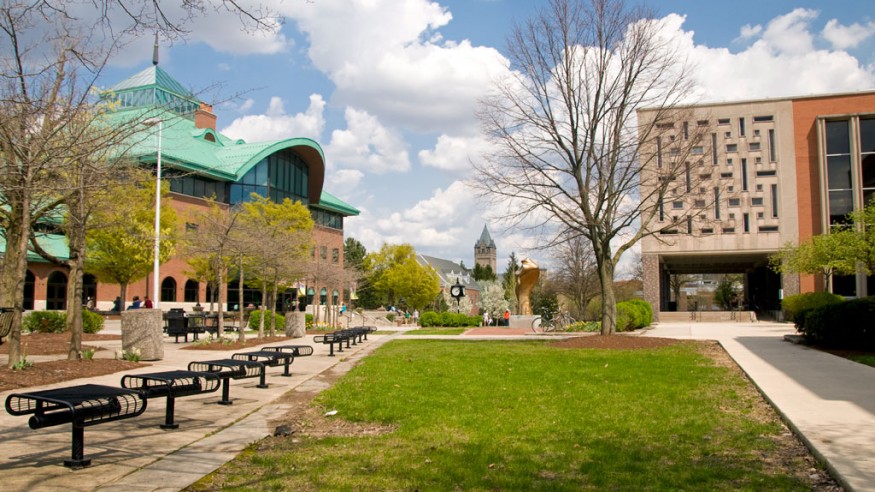
Enhancing Sustainability at OWU
Ohio Wesleyan continues to go green with measures to cut energy use and more. (Photo courtesy of OWU’s Office of Marketing and Communication)
Inefficient light bulbs are being replaced with energy-efficient counterparts, about 250 public computers will have sleep-mode activation, and public printers will default to double-sided printing.
These are only a few of the wide-sweeping initiatives being adopted to slash energy use, reduce operating costs, and enhance sustainability at Ohio Wesleyan University.
Changes are as small as removing lamps in some areas of residence halls and as big as installing occupancy sensors in all buildings (to turn off lights in unoccupied areas), says Sean Kinghorn, OWU’s energy conservation and sustainability coordinator.
Kinghorn and Building and Grounds Director Chris Setzer are working with senior staff on a new building temperature setback and energy conservation plan and an educational component for the campus, which will be outlined in the fall.
The results of last year’s campus-wide energy survey are being studied. Following recommendations in the survey, individual boilers will be installed to heat Hamilton-Williams Campus Center and Chappelear Drama Center, with both buildings no longer being tied in to the campus’s steam-pipe system.
“These energy-saving strategies will reduce Ohio Wesleyan’s environmental impact and improve its bottom line,” says Laurie Anderson, Professor of Botany/Microbiology and Chair of the OWU Sustainability Task Force, “I look forward to seeing the data on both our carbon footprint and energy expenses next year.”
Other Energy-Savings InitiativesTrayless Dining in Smith Hall
Students eating in Smith Dining Hall no longer will use trays—a move that will reduce water consumption by one-third to one-half gallon per tray per meal, according to industry research. Previously, Smith Hall held weekly “Trayless Tuesdays.”
Trays will be used only at the collection point for dirty dishes—resulting in a projected 60 percent reduction in overall tray usage. Previously, about 3,000 trays were used and cleaned each week, according to research by Chartwells, which provides OWU’s dining services.
“Trayless dining reduces an institution’s environmental footprint by decreasing waste, conserving natural resources (energy and water), and reducing the introduction of polluting detergents, rinses, and drying agents into the water table—as well as the costs to purchase them,” says Kinghorn. He added that a study by ARAMARK involving 25 colleges and universities indicated that trayless dining reduced food waste by 25-30 percent per person.
Streamlining Cold Drink Vending Machines
Ohio Wesleyan, in partnership with The Coca-Cola Company, is implementing an energy conservation program with the cold drink vending machines on campus. Older, inefficient machines will be swapped for new Energy Star-rated machines. Newer machines are now delamped (lights removed) and timers are installed to reduce energy for cooling in off-hours (when buildings are closed). Machines that have low sales returns will be removed or relocated for better public access.
These measures will save an estimated 40 percent in energy operating costs for the drink machines. Coca-Cola supports and advocates for these energy and cost savings measures.
During the summer one machine was moved from the staff room in Beeghly Library to a public location there; one of two machines was removed from the lower level of University Hall; and one machine was removed from the basement of Bashford Hall, with a second machine remaining in that building. Machines were removed from the Corns Building and Sturges Hall, which are close to other buildings with soft drink machines remaining.
More details about Ohio Wesleyan’s energy- and cost-saving sustainability initiatives will be announced in the near future.
